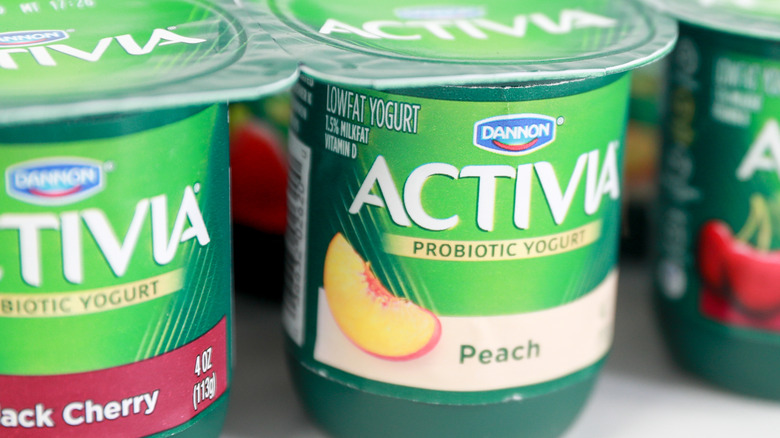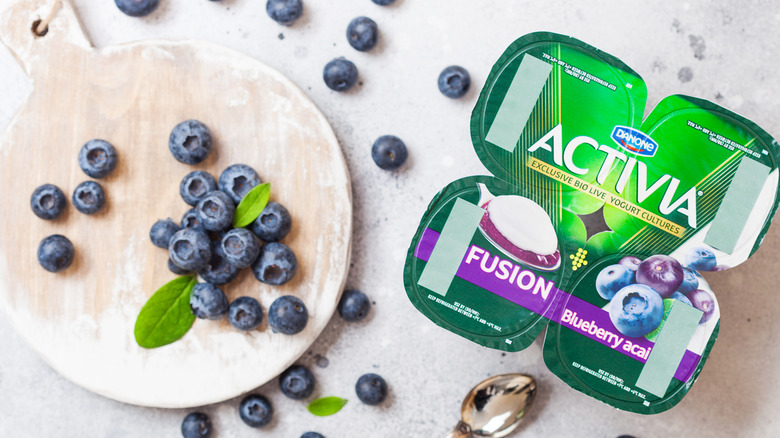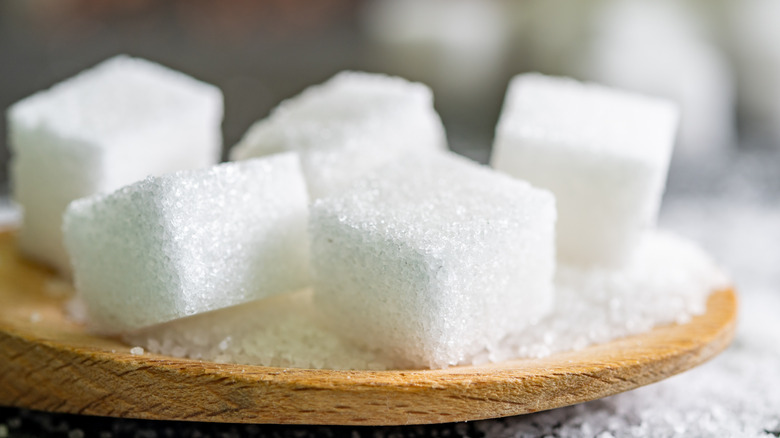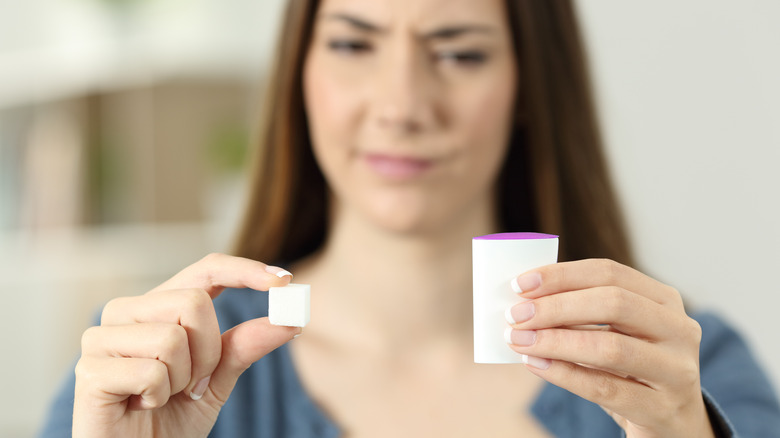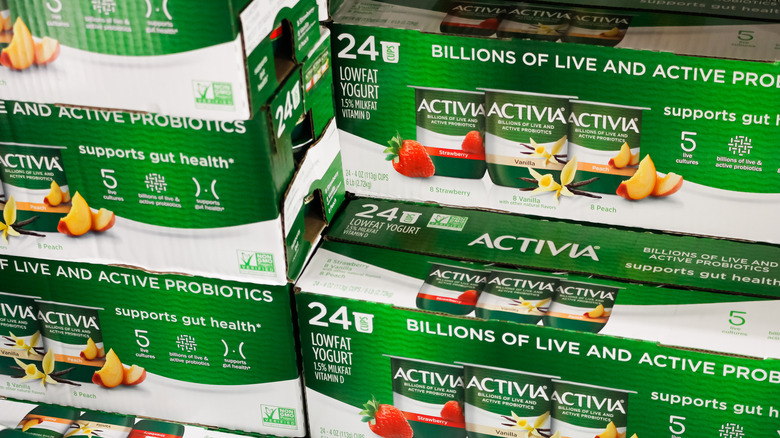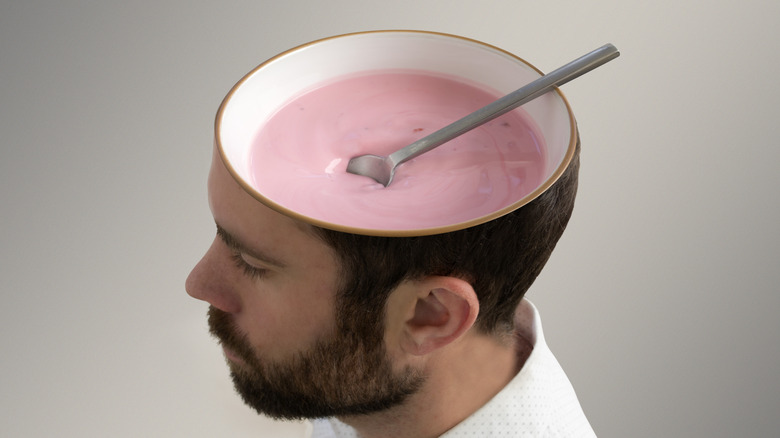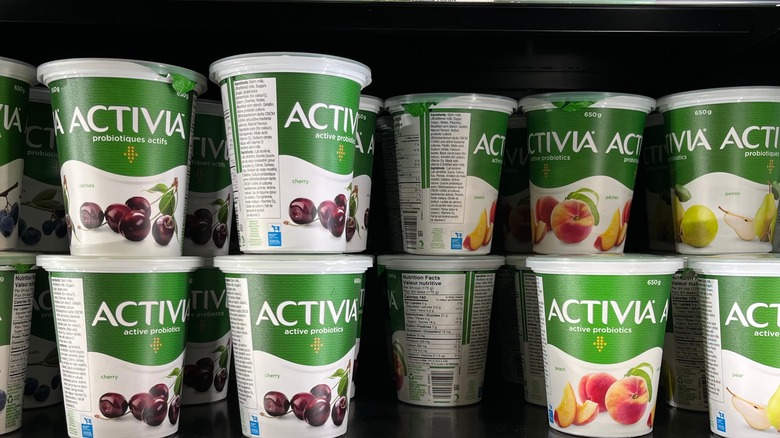What Really Happens To Your Body When You Eat Activia Yogurt
Activia yogurt became somewhat of a household name in the early 2000s, partly thanks to its famous spokesperson, Jamie Lee Curtis, who was the face of the brand's advertisements for seven years. During that time, Activia's parent brand, Dannon, came under fire by the FTC for its allegedly exaggerated claims about its potential health benefits. In 2021, Curtis admitted that she starred in the commercials mostly because commercials allowed her to make money while remaining close to her family, a luxury that film acting didn't afford her (via Today).
So, the FTC and Curtis may not be as big of fans of Activia as we once thought. Still, Activia has held its spot on grocery store shelves for over 20 years, so those packs of creamy yogurt must have some redeeming qualities. Today, the brand offers probiotic drinks and several probiotic yogurt varieties, including its 60-calorie yogurts, fiber-focused yogurts, and Greek yogurt varieties (via Activia). Which begs the question: What really happens to your body when you eat Activia yogurt?
What's in Activia yogurt?
Activia yogurt is available in multiple varieties, with its Probiotic Yogurt with Fruit being one of its most well-known versions. You can choose between several fruits and flavors, like mango, strawberry banana, and prune. A four-ounce container has about 80-90 calories, 1.5 grams of fat, 15 grams of carbs, four grams of protein, and eight grams of added sugar, depending on the flavor. You'll also get a decent amount of calcium, potassium, and vitamin D in each one-container serving. Reduced-fat milk, cane sugar, and real fruit top the list of ingredients.
Activia's other varieties cater toward specific dietary needs and interests, like low fat, high fiber, or low calorie. There's even a dairy-free version with four unique flavors — Blueberry Acai, Raspberry Pomegranate, Vanilla Cinnamon, and Peach Hibiscus — that use almond milk rather than cow's milk for dairy-sensitive consumers. Activia's Probiotic 60 Calories Yogurt has no added sugars and non-fat milk, resulting in a lower-calorie option that still delivers traditional flavors like blueberry and vanilla.
You'll add more probiotics to your diet by eating Activia Yogurt
Since its introduction to the market, Activia has touted its focus on probiotics. According to Activia, "While all yogurts have live and active cultures, not all have probiotic strains that provide specific health benefits such as supporting gut health and contributing to the maintenance of a balanced gut microbiota." What does that mean, exactly?
Probiotics are necessary for digestive health. Research has shown that certain probiotics can prevent and treat diarrhea, digestive tract infections, irritable bowel syndrome, and Crohn's disease. They also have other health benefits, like treating and preventing vaginal infections, childhood eczema, and urinary tract infections (via Harvard Health Publishing). Notably, modern research links gut health with brain health, so gut improvement through probiotics and a balanced diet could potentially lead to a healthier nervous system (via Johns Hopkins Medicine).
Although there's no set criteria for how many probiotics you should ingest each day, an article in American Family Physician notes that adult dosages typically fall between 10 to 20 billion colony-forming units. According to Activia, each cup of its yogurt contains billions of probiotics.
You may experience some digestive issues at first
Don't be surprised if you're a new Activia eater and you start experiencing some digestive discomfort at first. It's not uncommon for probiotics to cause tummy troubles if you aren't used to consuming them. According to the Cleveland Clinic, the first few days of probiotic ingestion can cause excess gas, mild stomach upset, or diarrhea. Some people may also experience bloating at first.
Most people who do experience stomach troubles as a result of taking probiotics will usually notice that the symptoms aren't as severe or noticeable at all after a few weeks. So, eating Activia regularly may help your body become more accustomed to probiotic ingestion. If your problems are bothersome, you might try introducing your stomach more slowly to Activia by eating half of a container at a time and finishing the other half later. However, if your symptoms worsen or don't get better over the first few weeks, consult your doctor (via Healthline).
Activia can improve your digestion over time
Most people can handle probiotics just fine with little to no symptoms (per Healthline). Over time, probiotics will go to work on your gut to balance its ecosystem and boost its population of good bacteria to protect it from tummy and immunity issues (per Cancer Treatment Centers of America). Activia claims that consumers should start feeling the differences of having regular probiotics in about two weeks if they consume two containers of Activia yogurt daily.
Unfortunately, the jury is still out on whether probiotics like those in Activia yogurt can help people with specific digestive issues, like constipation or irritable bowel syndrome (IBS). A 2020 scientific review published in Przeglad Gastroenterologiczny found that, as a whole, the clinical trials it researched did not conclude that probiotics are effective in treating constipation. The results varied based on the probiotic strain, dose, timing, and patient's health and lifestyle. Some patients simply responded better to probiotic treatments than others, signaling that probiotics may not be a one-size-fits-all approach to digestive conditions.
You'll give your body a boost with the protein and nutrients in Activia
It's well known by experts that yogurt packs in a lot of nutrition, and Activia is no exception. Many of its yogurt varieties contain at least four grams of protein, with its Greek yogurt offering 12 grams.
Protein is necessary for muscle health. If you want to bulk up and strengthen those muscles, eating Activia yogurt after a workout might be the way to do it. According to the Mayo Clinic, adding some fresh fruit to yogurt to snack on after a workout is one of the best snacks you can eat to nourish your body. A 2019 article in Nutrition Today also states that dietary protein is a building block of bone cells. Additionally, calcium plays a role in preventing osteoporosis. One container of Activia's yogurt with fruit contains about 10% of your daily calcium intake.
Those aren't all the potential benefits of Activia, though. Yogurt may also have a positive influence on your blood pressure, according to research published in the International Dairy Journal (via ScienceDaily). The study's researchers explained that regular yogurt consumption led to an average lowered blood pressure of about seven points compared to those who weren't yogurt eaters. That's because yogurt typically contains heart-healthy micronutrients, like potassium and calcium, which are both in Activia yogurts.
You could be consuming a lot of sugar
Activia yogurt certainly has some health benefits, but as is the case with yogurt in general, not every aspect may be a healthy part of a balanced diet. Some Activia yogurt varieties have a good amount of added sugar, which isn't a good thing if you're trying to limit sugar consumption or watch your weight.
For example, Activia Probiotic Yogurt with Fruit has 7-8 grams of added sugars, depending on the flavor. And, Activia's Probiotic Yogurt with Fiber adds 12 grams of sugar to your diet, nine of which are added sugars. The American Heart Association recommends including no more than 36 grams of sugar daily for men and a maximum of 25 grams daily for women.
Does that mean that diabetics and prediabetics should avoid Activia yogurts that include sugar? Research shows that probiotic yogurt can have positive effects on overall blood glucose control for prediabetics and diabetics. However, it's important to be cautious with added sugar in any kind of yogurt (via Medical News Today). Watch serving sizes and consider the low-calorie, no-sugar-added variety of Activia to limit sugar content.
If you eat Activia yogurt, you might consume controversial sweeteners and additives
Not all Activia yogurt adds sugar to your diet. Its Probiotic 60 Calories Yogurt varieties contain no added sugar. However, this variety still uses an artificial sweetener known as sucralose, which has been the subject of controversy for quite some time. According to Cleveland Clinic, a chemical process is able to make sucralose 600 times sweeter than regular sugar. Unfortunately, research has linked sucralose with inflammation and weight gain. It may even increase blood glucose and insulin levels in some people, which regular sugar also does.
Some Activia varieties with sugar, like its Probiotic Yogurt with Fruit, also include carrageenan, a food additive that could have negative effects on your digestive system. It's generally used to thicken food products, but research has shown that it leads to inflammation and could potentially be a carcinogenic substance. Some scientific groups have even gone as far as to recommend that the government bans the ingredient in consumables (via MedicineNet). In contrast, other research has linked it to benefits like lowering cholesterol and having antiviral and antioxidant effects.
Eating Activia yogurt might be able to help treat vaginal yeast infections
The probiotics that Activia contains aren't just good for your gut; they may also have some positive effects on the vagina. According to Harvard Health Publishing, eating yogurt with probiotics could balance the vagina's ecosystem. Specifically, the bacteria strain Lactobacilli, in its ideal amounts, can help prevent infections by creating an environment that kills off unhealthy bacteria.
Interestingly, Harvard Health Publishing also notes that some women have elected to insert probiotic yogurt into the vagina rather than eating it for a more direct way to treat chronic yeast infections. Actress Gabrielle Union has even admitted in an interview with Unstyled (via Health) to trying the procedure at home to cure a yeast infection. "I ended up in a situation where I had a yeast infection, and I didn't want to go to CVS to buy Monistat," said Union." While she didn't state the brand of yogurt, Union did say it was vanilla-flavored and offered "a bit of relief." We recommend the old-fashioned way of eating Activia yogurt to see if it helps and checking with your primary care physician before using it internally to treat yeast infection symptoms.
Is it safe to eat Activia while pregnant or nursing?
So, how does Activia fare for pregnant or breastfeeding women? Some women might be concerned about Activia's ingredients and whether things like probiotics or sucralose can interfere with pregnancy or nursing.
Healthline states that including probiotics in your diet during pregnancy is linked to better gut health and can potentially lower the risk of complications. An article published in Canada Family Physician also explains that infection from probiotics is rare and that probiotics don't usually make their way into breastmilk, posing little to no harm to a nursing baby.
Sucralose also poses little risk for pregnant women and nursing babies, and the Food and Drug Administration has given the thumb's up for both (via the American Pregnancy Association). As for carrageenan, OBGYN Dr. Kecia Gaither says that it's actually an important ingredient for giving baby formula its consistency and that research has proved its safety for infants (via GlobeNewswire).
In short, Activia, when part of a healthy and balanced diet, is likely safe for most pregnant women to consume. However, it's always a good idea to check with your doctor if you have any concerns about specific foods.
You might get a brain boost
When your gut is happy, so is your brain. At least, that's what science tells us. According to Harvard Health Publishing, your gut has direct links to your brain, producing many of the same chemicals that the organ upstairs does. Your gut even produces the feel-good chemicals you need to be in a good mood. It stands to reason, then, that the probiotics in Activia yogurt could play an important role in your overall mood and brain function, too.
Research in Frontiers in Psychiatry explored the effects of consuming probiotics regularly for several weeks. Researchers measured each participant's mood, personality dimensions, and sleep quality before, during, and after the study's six weeks. In the end, they found a "significant improvement in mood" with those taking probiotics, even going so far as to notice reduced anger and better sleep quality.
Harvard Health Publishing also notes that probiotics can assist with overall cognition, with some research showing improved scoring on cognitive impairment tests after following probiotic regimens.
Is Activia yogurt good for you?
All things considered, Activia is generally safe for healthy adults to eat as part of a balanced diet. Most varieties only add about 90 calories to your day's calorie total, and Activia's dose of probiotics could help your gut reach a healthier state. However, people who are concerned about added sugars, like diabetics or those with insulin sensitivity, should be careful about how much they consume or stick to a no-sugar-added variety, like Activia Probiotics 60 Calorie Yogurt.
Registered dietician Amanda Blechman even goes as far as to tell Eat This, Not That! that Activia is her second recommendation for the best yogurt on grocery store shelves. The best feature, according to Blechman, is its added probiotics, but she also loves that Activia offers plant-based options for dairy-free eaters.
When is the best time to add some Activia to your day? According to research published in Beneficial Microbes, probiotics seem to do their best work when taken with or just before a meal with healthy fats. Certified nutritional coach Lisa Richards explains: "This is the time when your stomach environment is at its least acidic because your body has not yet begun to produce stomach acid in large quantities to digest your food. Taking your probiotics at this time will make their passage to your gut a little easier and ensure you get the most from those beneficial bacteria" (via Well and Good).

